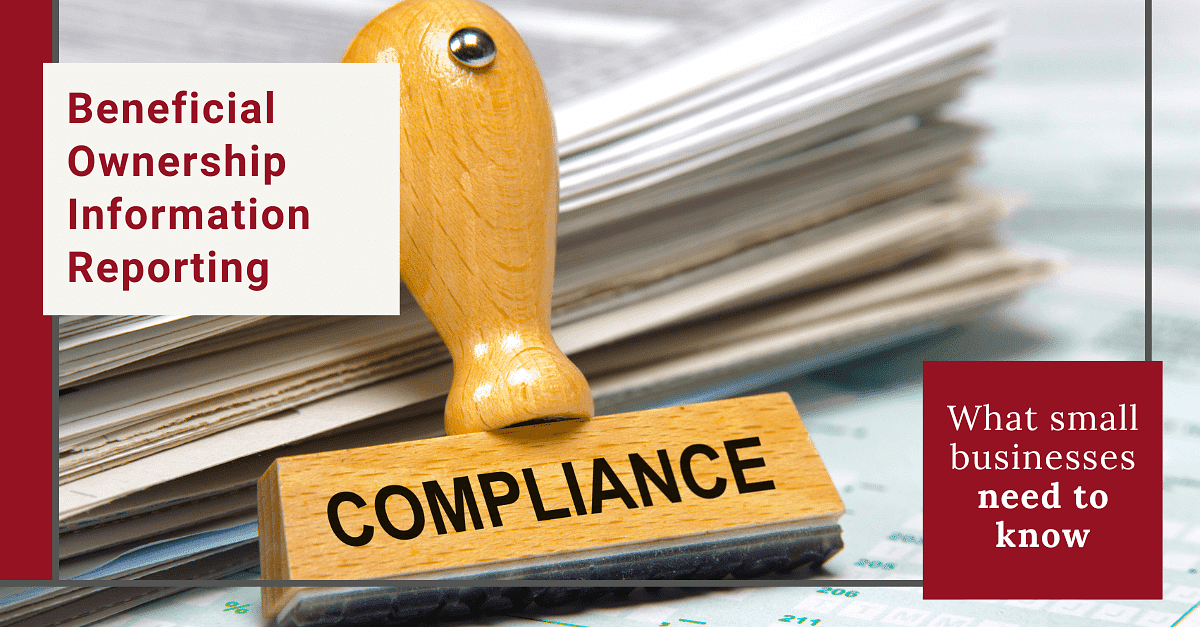
New Requirements for Small Businesses: Beneficial Ownership Information Reporting

By Gretchen Roberts

Welp, the government has gone and done it again. In an effort to crack down on money laundering, financing terrorism, tax fraud, and other illegal acts via sketchy shell companies, Congress has enacted the Corporate Transparency Act. If you’re a small business owner, you and about 32 million other business entities have a part to play in fighting the bad guys.
Reporting requirements kicked off in January 2024, and there are some pretty steep fines for non-compliance ($500/day up to $10,000 and 2 years in jail). Before you start wondering how an orange jumpsuit goes with your coloring, there is some good news: It’s not that hard to comply. Here’s what you need to know.
Who’s in charge of Beneficial Ownership Information Reporting?
FinCEN, part of the U.S. Treasury, is running this play. It’s not about taxes per se, but rather about stopping bad people from doing bad things while hiding behind shell companies.
Who has to file a Beneficial Ownership Information Report?
The Corporate Transparency Act requires nearly all newly-formed and existing companies to file a report starting on Jan. 1, 2024. This includes LLCs, Corporations, and other entities that are created by filing relevant documents with your secretary of state. Any foreign companies that are registered to do business in the U.S. are also required to report.
What are the deadlines for filing a BOI Report?
BOI reporting kicked off Jan. 1, 2024. Existing businesses that were an entity prior to that date have a full year, until Jan. 1, 2025, to complete their reports. (That said, it’s super-simple and we recommend getting it done and checked off your list).
New businesses that are formed on or after Jan. 1, 2024, must report within 90 days of creating their entity.
Happily, this isn’t an annual requirement. You only have to do it once unless you need to update or correct information such as adding or dropping a shareholder, changing addresses, etc., in which case you must make the update within 30 days of the change.
Or, if you were previously exempt and now aren’t, you need to get filing too.
What information is collected in BOI reporting?
Each reporting company must provide the following information about each beneficial owner (someone who substantially controls and/or owns 25% or more of the company):
- Name
- Date of Birth
- Address
- U.S. driver’s license or passport or other qualifying document
Are there exemptions?
Of course, we’re talking about the U.S. government! There’s a big list of exceptions, but if you’re unsure we suggest you take the free BOI quiz at File Forms and/or consult with your attorney to determine if you need to file.
Oh, and you get an exemption too if your entity meets all three of these criteria:
- Employs more than 20 full-time employees in the U.S.
- Has an operating presence in a physical U.S. based office
- Has more than $5 million in sales
Can Red Bike Advisors fill out my reports?
There’s some question of whether filling out these reports is considered practicing law without a license, so we’ve opted not to do them for clients since they’re not related to the IRS or taxation as noted above.
Here are three options you can explore:
- Do it yourself: You can fill the form out yourself on the BOI e-filing site.
- Use an online filer: File Forms will do it for you–and they even have a free BOI quiz to determine if you need to file. (Please note that the File Forms link is a referral link which you are under no obligation to use.)
- Have your attorney file for you: If you are not comfortable with either of the above options or need professional consultation on your situation, we recommend asking your attorney for help.
Where can I find more information about BOI reporting?
Head straight to the source: FinCEN’s website for information about BOI reporting.
Disclaimer: This article is provided for informational purposes only and is not to be relied upon as a professional opinion whatsoever. Please consult with your attorney for more information about the Beneficial Ownership Reporting requirements specific to your situation.